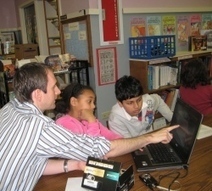
At David C. Barrow Elementary School in Athens, Ga., media specialist Andy Plemmons works with two students to learn how to use the technology they need for the Barrow Oral History Project.
Via Scoop.it – Student Learning through School Libraries
This converge article features a number of TL practitioners in the state of Georgia and explores how school library staff can work with teachers to integrate digital literacy into the curriculum.
The article presents 5 digital literacy challenges:
1. Access to technology
2. Filtering
3. Sharing the importance of digital literacy
4. Instructional time
5. Teaching young children
with advice from TL practitioners on how to overcome them.
The article concludes:
“At these three libraries in Georgia — and in libraries across the country — library staff overcome challenges to teach students the digital literacy skills they need”,
with a final quote from one of our fave TL ambassadors in the US, Buffy Hamilton who sums up the work of the TL:
“At the end of the day, our emphasis is on learning and providing learning experiences and access to information in as many formats as possible.”
This article provides evidence of a range of ways that teacher librarians support students’ development as digital citizens who are content creators as well as critical users of information.
Note this article also features in Converge Magazine’s Top 10 K-12 Stories of 2011. If you are interested in technology integration, introduction of iPads in schools, bring your own device (BYOD) programs and flipped classrooms, these stories are well worth checking out.





